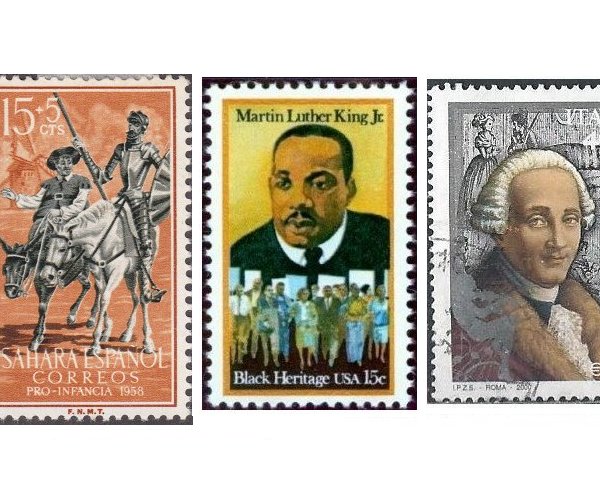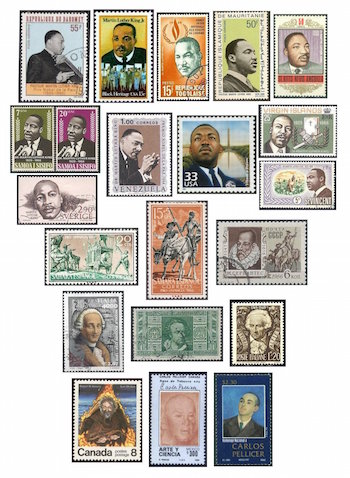The Arts on the Stamps of the World — January 16
An Arts Fuse regular feature: the arts on stamps of the world.

By Doug Briscoe
Today we present a philatelic salute to Dr. Martin Luther King, Jr. for MLK Day. On this date in 1605, the first edition of the first book of Don Quixote by Miguel de Cervantes was published in Madrid. As for birthdays, we celebrate 18th-century opera composer Niccolò Piccinni and three poets: Vittorio Alfieri, Robert W. Service, and Carlos Pellicer.
Since 1986, the third Monday in January has been recognized as Martin Luther King, Jr. Day (his actual birthday is the 15th). Dr. King is represented on a great many stamps from all over the world; I give a small selection. So much music has been written in memory of King that A Catalog of Music Written in Honor of Martin Luther King, Jr by Anthony McDonald was published in 1996, with updated editions in 1999 and 2011! Again, I cite just a very few examples. Among the more well-known pieces are Luciano’s Berio’s “O King” (1968) and Joseph Schwantner’s “New Morning for the World” (1982); some others are Goffredo Petrassi’s chamber oratorio “Beatitudines” (1969), David Baker’s cantata “Black America” (1968); Swedish composer Jan Carlstedt’s Symphony no. 2, “A Symphony of Brotherhood” (1968); and Steven Douglas Burton’s Symphony no. 6, subtitled “I Have a Dream” (1987). Elie Siegmeister wrote a cantata, also titled “I Have a Dream,” during King’s lifetime (1967). King’s inspiration in the realms of literature, film, and the visual arts I leave to your own endeavors.
Don Quixote has been the subject of many worldwide stamp issues, from which I selected two from the old Spanish colony of Spanish Sahara and one from the USSR.
Born in Bari, Niccolò Piccinni (16 January 1728 – 7 May 1800) studied under Leonardo Leo and Francesco Durante. His first important success came in 1760 with his comic opera La Cecchina, ossia la buona Figliuola, libretto by Goldoni. It ran for two years in Rome as well as being performed throughout Europe. In Paris, whither he had been invited by Marie Antoinette, no less, the directors of the Grand Opera concocted a rivalry ($) between Piccinni and Gluck, which developed into a nasty contretemps from which the composers themselves largely remained aloof. With the coming of the Revolution, Piccinni was held under house arrest in Naples for four years. After nearly a decade in Venice, Naples, and Rome he returned to Paris in 1798 and died at Passy two years later. He is certainly best known as a composer of opera, but he also produced sacred music, symphonies, and chamber music. The Italian stamp was issued in 2000 for the bicentenary of his death.

Piccinni’s younger contemporary Count Vittorio Alfieri (1749 – 8 October 1803) was born to wealth and privilege. Interested in literature from an early age, he turned to drama and produced about ten tragedies besides his many sonnets and five odes dealing with the subject of American independence. Though faulted for his stylistic imperfections, Alfieri is still considered the “founder of Italian tragedy” and held in enough esteem that he can be seen on two Italian stamps of 1932 and 1949.
Robert W. Service (1874 – September 11, 1958), though called “the Bard of the Yukon”, was born in Lancashire, England and didn’t visit the Yukon until he was 30. After the success of his poems “The Shooting of Dan McGrew” and “The Cremation of Sam McGee”, found in his first collection, Songs of a Sourdough (1907), he tried his hand at a novel, The Trail of ’98, which also proved a best-seller. He lived in Paris after 1913, serving as an ambulance driver in World War I. In the 20s Service hobbed nobs with literati such as H.G. Wells, Somerset Maugham, James Joyce, and Frank Harris in the south of France and wrote thriller novels. He lived in California during the Second World War but returned to Europe, alternating between Brittany and Monte Carlo, for the rest of his life. With much of his work modeled on Kipling, Service has been belittled for his populism, but he himself wrote, “Verse, not poetry, is what I was after … something the man in the street would take notice of and the sweet old lady would paste in her album.” When Canada put out a stamp for him in 1976, it chose to illustrate his poem “The Cremation of Sam McGee.”
Carlos Pellicer Cámara (1897 – February 16, 1977) is seen as belonging to the first wave of modernist Mexican poets. With Diego Rivera and others, he co-founded the Grupo Solidario del Movimiento Obrero (“Solidarity Group of the Workers’ Movement”). His work is noted for its focus on various aspects of nature. At the end of his life he was elected as a representative of the region of Tabasco, where he was born, in the Mexican Senate. He is honored on two stamps of Mexico, the first from 1988 and the later one from 1997.
A graduate of the University of Massachusetts with a B.A. in English, Doug Briscoe worked in Boston classical music radio, at WCRB, WGBH, and WBUR, for about 25 years, beginning in 1977. He has the curious distinction of having succeeded Robert J. Lurtsema twice, first as host of WGBH’s weekday morning classical music program in 1993, then as host of the weekend program when Robert J.’s health failed in 2000. Doug also wrote liner notes for several of the late Gunther Schuller’s GM Recordings releases as well as program notes for the Boston Classical Orchestra. For the past few years he’s been posting a Facebook “blog” of classical music on stamps of the world, which has now been expanded to encompass all the arts for The Arts Fuse.
